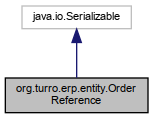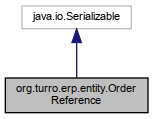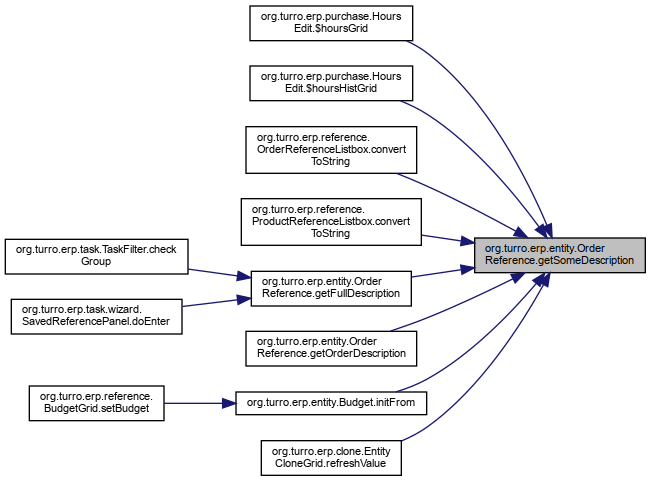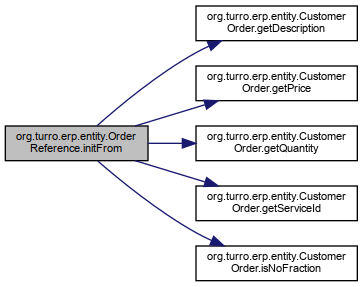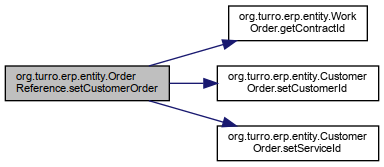◆ clearEmptyLines()
| void org.turro.erp.entity.OrderReference.clearEmptyLines |
( |
| ) |
|
Definition at line 280 of file OrderReference.java.
281 Iterator<Task> it = tasks.iterator();
282 while(it.hasNext()) {
285 t.setOrderReference(
null);
289 Iterator<Breakdown> itb = breakdowns.iterator();
290 while(itb.hasNext()) {
291 Breakdown b = itb.next();
◆ getBreakdowns()
| Set<Breakdown> org.turro.erp.entity.OrderReference.getBreakdowns |
( |
| ) |
|
◆ getBudgets()
| Set<Budget> org.turro.erp.entity.OrderReference.getBudgets |
( |
| ) |
|
◆ getCost()
| double org.turro.erp.entity.OrderReference.getCost |
( |
| ) |
|
◆ getCustomerOrder()
| CustomerOrder org.turro.erp.entity.OrderReference.getCustomerOrder |
( |
| ) |
|
◆ getDescription()
| String org.turro.erp.entity.OrderReference.getDescription |
( |
| ) |
|
◆ getFullDescription()
| String org.turro.erp.entity.OrderReference.getFullDescription |
( |
| ) |
|
◆ getHtmlDescription()
| String org.turro.erp.entity.OrderReference.getHtmlDescription |
( |
| ) |
|
◆ getId()
| long org.turro.erp.entity.OrderReference.getId |
( |
| ) |
|
◆ getOrderDescription()
| String org.turro.erp.entity.OrderReference.getOrderDescription |
( |
| ) |
|
◆ getOrderRef()
| int org.turro.erp.entity.OrderReference.getOrderRef |
( |
| ) |
|
◆ getPrice()
| double org.turro.erp.entity.OrderReference.getPrice |
( |
| ) |
|
◆ getProduct()
| Product org.turro.erp.entity.OrderReference.getProduct |
( |
| ) |
|
◆ getProductId()
| long org.turro.erp.entity.OrderReference.getProductId |
( |
| ) |
|
◆ getQuantity()
| double org.turro.erp.entity.OrderReference.getQuantity |
( |
| ) |
|
◆ getRetention()
| double org.turro.erp.entity.OrderReference.getRetention |
( |
| ) |
|
◆ getService()
| Contract org.turro.erp.entity.OrderReference.getService |
( |
| ) |
|
◆ getServiceId()
| long org.turro.erp.entity.OrderReference.getServiceId |
( |
| ) |
|
◆ getSomeDescription()
| String org.turro.erp.entity.OrderReference.getSomeDescription |
( |
| ) |
|
◆ getStatusWrapper() [1/2]
◆ getStatusWrapper() [2/2]
◆ getTasks()
| SortedSet<Task> org.turro.erp.entity.OrderReference.getTasks |
( |
| ) |
|
◆ getTax()
| double org.turro.erp.entity.OrderReference.getTax |
( |
| ) |
|
◆ getUpdatedTasks()
| Set<Task> org.turro.erp.entity.OrderReference.getUpdatedTasks |
( |
| ) |
|
Definition at line 308 of file OrderReference.java.
310 Dao dao =
new ErpPU();
311 tasks = dao.lazyLoader(OrderReference.class,
this,
"tasks").tasks;
◆ getWorkOrder()
| WorkOrder org.turro.erp.entity.OrderReference.getWorkOrder |
( |
| ) |
|
◆ hasAcceptedBudget()
| boolean org.turro.erp.entity.OrderReference.hasAcceptedBudget |
( |
| ) |
|
Definition at line 343 of file OrderReference.java.
344 if(budgets.isEmpty())
return false;
345 for(Budget b : budgets) {
◆ hasBugdetStopper()
| boolean org.turro.erp.entity.OrderReference.hasBugdetStopper |
( |
| ) |
|
◆ hasPendingBudget()
| boolean org.turro.erp.entity.OrderReference.hasPendingBudget |
( |
| ) |
|
◆ initFrom()
| void org.turro.erp.entity.OrderReference.initFrom |
( |
CustomerOrder |
cu | ) |
|
Definition at line 316 of file OrderReference.java.
317 this.customerOrder = cu;
318 description = cu.getDescription();
319 noFraction = cu.isNoFraction();
320 quantity = cu.getQuantity();
321 price = cu.getPrice();
322 serviceId = cu.getServiceId();
◆ isDelivered()
| boolean org.turro.erp.entity.OrderReference.isDelivered |
( |
| ) |
|
◆ isEmpty()
| boolean org.turro.erp.entity.OrderReference.isEmpty |
( |
| ) |
|
Definition at line 274 of file OrderReference.java.
275 boolean empty = (Strings.isBlank(description) && productId == 0) ||
◆ isNoFraction()
| boolean org.turro.erp.entity.OrderReference.isNoFraction |
( |
| ) |
|
◆ isValidated()
| boolean org.turro.erp.entity.OrderReference.isValidated |
( |
| ) |
|
◆ prepareForSaving()
| void org.turro.erp.entity.OrderReference.prepareForSaving |
( |
| ) |
|
◆ requiresBudget()
| boolean org.turro.erp.entity.OrderReference.requiresBudget |
( |
| ) |
|
◆ setBreakdowns()
| void org.turro.erp.entity.OrderReference.setBreakdowns |
( |
Set< Breakdown > |
breakdowns | ) |
|
◆ setBudgets()
| void org.turro.erp.entity.OrderReference.setBudgets |
( |
Set< Budget > |
budgets | ) |
|
◆ setCustomerOrder()
| void org.turro.erp.entity.OrderReference.setCustomerOrder |
( |
CustomerOrder |
customerOrder | ) |
|
Definition at line 99 of file OrderReference.java.
100 this.customerOrder = customerOrder;
101 if(customerOrder !=
null) {
void setServiceId(long service)
void setCustomerId(long customerId)
◆ setDelivered()
| void org.turro.erp.entity.OrderReference.setDelivered |
( |
boolean |
delivered | ) |
|
◆ setDescription()
| void org.turro.erp.entity.OrderReference.setDescription |
( |
String |
description | ) |
|
◆ setId()
| void org.turro.erp.entity.OrderReference.setId |
( |
long |
id | ) |
|
◆ setNoFraction()
| void org.turro.erp.entity.OrderReference.setNoFraction |
( |
boolean |
noFraction | ) |
|
◆ setOrderRef()
| void org.turro.erp.entity.OrderReference.setOrderRef |
( |
int |
orderRef | ) |
|
◆ setPrice()
| void org.turro.erp.entity.OrderReference.setPrice |
( |
double |
price | ) |
|
◆ setProduct()
| void org.turro.erp.entity.OrderReference.setProduct |
( |
Product |
product | ) |
|
◆ setProductId()
| void org.turro.erp.entity.OrderReference.setProductId |
( |
long |
productId | ) |
|
◆ setQuantity()
| void org.turro.erp.entity.OrderReference.setQuantity |
( |
double |
quantity | ) |
|
◆ setRetention()
| void org.turro.erp.entity.OrderReference.setRetention |
( |
double |
retention | ) |
|
◆ setService()
| void org.turro.erp.entity.OrderReference.setService |
( |
Contract |
service | ) |
|
◆ setServiceId()
| void org.turro.erp.entity.OrderReference.setServiceId |
( |
long |
serviceId | ) |
|
◆ setTasks()
| void org.turro.erp.entity.OrderReference.setTasks |
( |
SortedSet< Task > |
tasks | ) |
|
◆ setTax()
| void org.turro.erp.entity.OrderReference.setTax |
( |
double |
tax | ) |
|
◆ setValidated()
| void org.turro.erp.entity.OrderReference.setValidated |
( |
boolean |
validated | ) |
|
◆ setWorkOrder()
| void org.turro.erp.entity.OrderReference.setWorkOrder |
( |
WorkOrder |
workOrder | ) |
|
The documentation for this class was generated from the following file:
